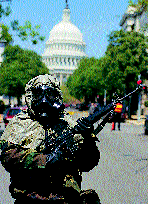Dengue and dengue hemorrhagic fever (DHF) are caused by one of
four closely related, but antigenically distinct, virus serotypes
(DEN-1, DEN-2, DEN-3, and DEN-4), of the genus Flavivirus. Infection
with one of these serotypes does not provide cross-protective immunity,
so persons living in a dengue-endemic area can have four dengue infections
during their lifetimes. Dengue is primarily a disease of the tropics,
and the viruses that cause it are maintained in a cycle that involves
humans and Aedes aegypti, a domestic, day-biting mosquito that prefers
to feed on humans. Infection with dengue viruses produces a spectrum
of clinical illness ranging from a nonspecific viral syndrome to severe
and fatal hemorrhagic disease. Important risk factors for DHF include
the strain and serotype of the infecting virus, as well as the age,
immune status, and genetic predisposition of the patient.
Symptoms
Dengue fever is characterized by the rapid development of a fever
that may last from 5 to 7 days, with intense headache, joint and muscle
pain, and a rash. The rash develops on the feet or legs, usually 3
to 4 days after the beginning of the fever. The hemorrhagic form of
dengue fever is more severe and associated with loss of appetite,
vomiting, high fever, headache, and abdominal pain. Shock and circulatory
failure may occur. Untreated hemorrhagic dengue results in death in
up to 50 percent of cases.
Transmission
Dengue is spread by the bite of infected Aedes mosquitoes.
Diagnosis
Dengue fever is diagnosed by a positive antibody test.
Treatment
There is no specific treatment available. Intravenous fluids
and oxygen therapy are often used for patients who experience shock
during their illness. No dengue vaccine is available. Recently,
however, attenuated candidate vaccine viruses have been developed
in Thailand. These vaccines are safe and immunogenic when given in
various formulations, including a quadrivalent vaccine for all four
dengue virus serotypes. Efficacy trials in human volunteers have yet
to be initiated. Research is also being conducted to develop second-generation
recombinant vaccine viruses; the Thailand attenuated viruses are used
as a template. Therefore, an effective dengue vaccine for public use
will not be available for 5 to 10 years.
Prevention
Control measures are limited to advising travelers to affected
areas to minimize exposure to mosquitoes. Use of protective clothing,
mosquito netting, and repellents are helpful in preventing mosquito
bites.

